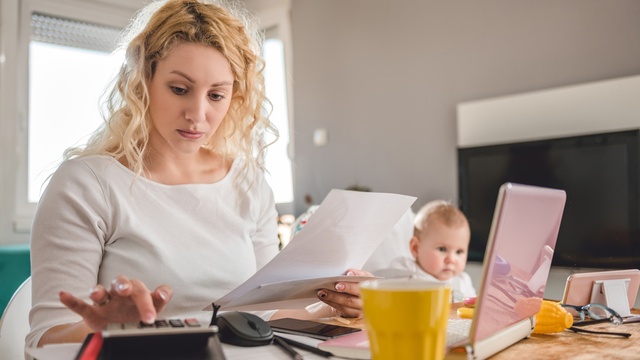The UK’s two million single parents are more likely to be living with problem debt, with many forced to go without food to make repayments, according to a new report.
Four in five (82%) single parents said they did not have enough income to meet living costs and were forced to get into debt.
Almost half (49%) of single parents reported taking on more debt since COVID-19, with the average amount of debt held by single parents increasing by around 15% during the pandemic. This equates, on average, to more than £600 more debt per household.
The research by Gingerbread, the charity for single-parent families, and debt charity StepChange, found that single parents struggled to work their way out of problem debt, meaning they were unable to afford credit repayments on a regular basis for three months or more.
How has debt impacted their daily life?
In order to make debt repayments, 66% of single parents have gone without food, while 20% have cut back on food so that they could feed their children.
More than half (51%) of single parents had fallen behind on rent or mortgage payments as a result of repaying their debts, while 19% had to use a food bank.
Who is most at risk of problem debt?
Single parents who worked full-time hours were more likely to be in problem debt, mainly because of increased childcare costs. They were also more likely to use credit to pay for childcare the more hours they worked. A quarter of those working full-time took out loans to pay for childcare, compared to 17% of those working part-time.
The report found that home schooling is also more costly for single parents, as they are twice as likely than couples with children, to have no computer at home and to have a child on free school meals.
Does economic abuse play a part?
Almost half (48%) of single parents who had experienced problem debt had been affected by economic abuse, with a former partner limiting how they used money or controlling how they acquired money as well as other economic resources. Just 24% of those who had experienced economic abuse received their full maintenance payments regularly.
Phil Andrew, chief executive of StepChange, said: “The findings of this report make for sobering reading, revealing that even before the pandemic, squeezed incomes, rising childcare costs and a lack of benefit protection were routinely sweeping single parents into hardship, even among those in work. COVID-19 has poured fuel on this fire, with alarming numbers of single parents using food banks and even skipping meals in order to feed their children.
“If we’re to end the debt trap facing so many single parents, the safety net around them must be strengthened, something the Government can do in the short term by committing to maintain the £20 uplift in Universal Credit, as well as by extending it to those on legacy benefits.”
What to do if you’re struggling with debt:
Depending on your situation, there are multiple options to consider, including debt consolidation products, payment holidays and debt management plans.
Everyone’s situation is different - and a solution that suits one person, may not suit another. Therefore, it really is best to get some impartial, free advice on what might be best for you. Charities such as StepChange can provide you with this.
If you believe you’re on top of your debt, but looking for ways to pay it off sooner - we have some tips on how to reduce your debt in 2021.
Disclaimer: We make every effort to ensure content is correct when published. Information on this website doesn't constitute financial advice, and we aren't responsible for the content of any external sites.







